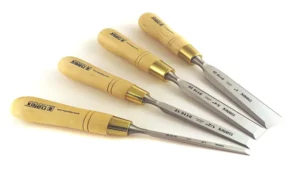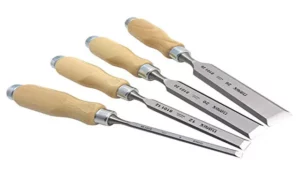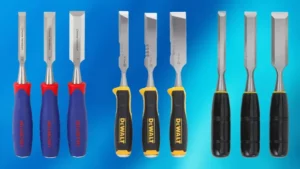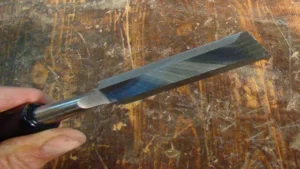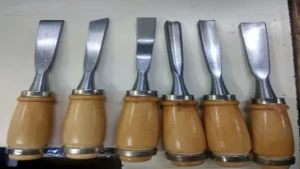Are you tired of using dull chisels that ruin your woodworking projects? Do you want to know how to choose the best sharpening stone for your chisels? Look no further! In this blog post, we will guide you through the process of selecting the perfect sharpening stone for your chisels, making them razor-sharp and ready to use. As a woodworking enthusiast, you know how crucial it is to have sharp tools. Not only does it make your work easier, but it also helps you achieve better results.
Sharpening your chisels regularly ensures that they are always ready to cut through wood like a hot knife through butter. However, with so many sharpening stones available in the market, it can be overwhelming to choose the right one for your needs. Different types of stones offer varying levels of abrasiveness, and each type has its advantages and disadvantages.
But worry not, as we’ve got you covered. We will discuss the different types of sharpening stones, their features, and how to choose the right one for your chisels. By the end of this post, you’ll be equipped with all the knowledge you need to make an informed decision and give your chisels a new lease on life.
So let’s dive in and sharpen those chisels!
Types of Sharpening Stones
When it comes to sharpening chisels, the type of sharpening stone you use can make a big difference in the final result. There are several types of sharpening stones, including oil stones, water stones, diamond stones, and ceramic stones. Each has its own benefits and drawbacks, so it’s important to choose the best one for your needs.
For chisels, many woodworkers prefer water stones because they can be used dry or wet and are known for their ability to sharpen quickly and efficiently. Additionally, water stones tend to produce a finer edge than other types of sharpening stones. Some of the most popular water stones for chisels include the King Combination Stone, the Naniwa Traditional Waterstone, and the Shapton Glass Stone.
Ultimately, the best sharpening stone for your chisels will depend on your personal preferences and the type of chisels you have.
Oil Stones
Oil Stones When it comes to sharpening dull edges on your blades, there is no better tool than a high-quality sharpening stone. There are several types of sharpening stones, but oil stones have been a popular choice for many years. These stones are made from natural or synthetic materials and are lubricated with oil to prevent clogging and facilitate the sharpening process.
Oil stones are available in different grades of coarseness, ranging from extra coarse to ultra-fine. Extra coarse stones are ideal for repairing chips and major damage to edges, while fine and ultra-fine stones are used for honing and refining edges to razor-sharpness. One advantage of oil stones is that they are long-lasting and require minimal maintenance.
However, they do require oiling before use and should be cleaned and stored appropriately to ensure longevity. With regular use, oil stones can keep your blades sharp and ready for any task.
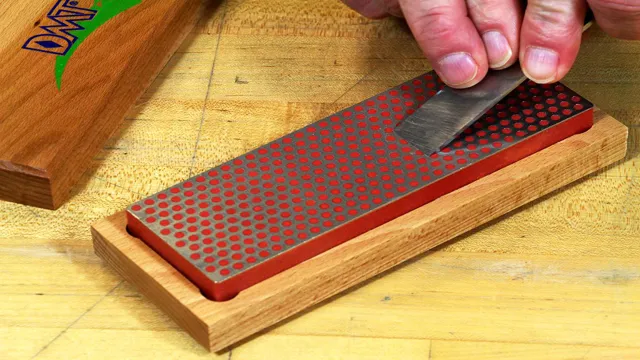
Water Stones
When it comes to sharpening your knives, using the right type of sharpening stone can make all the difference. Water stones are a popular choice among professional chefs and home cooks alike due to their versatility and effectiveness. There are several types of water stones available, each with its own unique qualities.
The first type is a grit stone, which is a coarse stone used for the initial sharpening of dull or damaged blades. Next, there are medium stones that are used for honing and refining the blade after it has been sharpened with the coarse stone. Finally, there are fine stones that are used for polishing and finishing the blade to achieve a razor-sharp edge.
It is important to choose the right type of stone for the job to ensure that your blades are sharpened properly and are safe to use. With the right technique and the right water stone, your knives will be sharp and ready for any kitchen task.
Diamond Stones
Diamond stones are an essential tool for keeping your knives and tools sharp and ready for use. There are various types of sharpening stones available in the market, each with its unique features and benefits. The diamond sharpening stone is one of the most durable and effective types of sharpening stones.
It is made from industrial-grade diamonds that are firmly held in place using a metal plate. The diamond sharpening stone can sharpen even the hardest materials, including ceramic and tungsten carbide. Their durability makes them an excellent choice for professionals who need a tough stone that can withstand heavy use.
The diamond sharpening stone is available in different forms, including continuous diamond stones, diamond plates, and diamond abrasive paste. Continuous diamond stones have a diamond-coated surface on one or both sides, making them ideal for sharpening straight-edged knives and other tools. Diamond plates, on the other hand, have a metal base with diamond particles embedded on the plate’s surface, which gives them a large surface area for sharpening.
Diamond abrasive paste is a fine diamond paste that is typically used for polishing. One crucial advantage of diamond stones is that they require less maintenance than other sharpening stones since they do not require oil or water for sharpening. They are also easier to clean after use since they do not absorb any liquid.
However, diamond stones can be more expensive than other sharpening stones, and they may require more care since a single scratch or nick on the surface can affect its effectiveness. In conclusion, the diamond sharpening stone is an excellent choice for anyone looking for a durable and effective means of sharpening their knives and tools. While they may be more expensive than other sharpening stones, their durability, and ability to sharpen a wide range of materials make them a worthwhile investment.
Factors to Consider in Choosing the Best Sharpening Stone
If you’re looking for the best sharpening stone for chisels, there are several factors to consider before making your final choice. First and foremost, you’ll want to think about the type of material you’d like your stone to be made from. Common options include diamond, ceramic, and natural stones like Arkansas or Japanese water stones.
Each has its own distinct advantages and disadvantages, so it’s a good idea to research and compare them before making your selection. Other important factors to consider include grit size, which affects the coarseness or fineness of the stone, and size and shape, which will determine how easy it is to use and store your sharpening stone. Ultimately, the best sharpening stone for chisels will depend on your individual needs and preferences, so take the time to do your research and find the option that works best for you.
Grit Size
When it comes to sharpening stones, one of the most important factors to consider is grit size. Grit size refers to the texture and coarseness of the stone, and it’s essential to choose the right grit size for the job at hand. If you’re sharpening a blade that’s very dull or damaged, you’ll want to start with a lower grit size, like 200 or 400.
These rougher stones can remove a lot of material quickly, but they can also leave scratches on the blade. As you progress through the grits, you’ll work your way up to finer stones, like 1000 or 2000 grit. These will remove any scratches left by the lower grits, leaving you with a sharper, smoother edge.
However, if you’re honing a blade that’s already fairly sharp, you won’t need to start with such a low grit size. In this case, you can start with a higher grit, like 1000 or 2000, and work your way up to a finer stone, like 6000 or 8000 grit. By choosing the right grit size for your job, you can ensure that you achieve the best possible results.
Stone Hardness
When it comes to sharpening knives and tools, choosing the right sharpening stone is important. One factor to consider is the stone’s hardness level. Harder stones, like diamond and ceramic options, are best for sharpening harder metals.
Softer stones, like natural water stones, are better for softer metals like carbon steel. The hardness of the stone also affects how long it will take to sharpen your blade. A harder stone will sharpen faster but may not provide as fine of an edge as a softer stone.
It’s important to consider what type of metal your blade is made of and how finely you want it sharpened when choosing a sharpening stone. With a little research and experimentation, you’ll be able to find the perfect stone for your sharpening needs.
Stone Size and Weight
When it comes to choosing the best sharpening stone, there are a few factors to consider, including the stone size and weight. The size of the stone typically correlates with the size of the blade you intend to sharpen. A larger stone is ideal for sharpening larger blades, while a smaller stone can work well for smaller blades.
Additionally, the weight of the stone can affect the ease of use and the pressure applied during sharpening. A heavier stone may provide more pressure, leading to a faster sharpening time, but it may also cause more fatigue during use. Conversely, a lighter stone may cause less fatigue but may require more time to achieve the desired sharpness.
Ultimately, it’s important to choose a stone that feels comfortable to use and can effectively sharpen your specific types of blades.
Best Sharpening Stones for Chisels
If you’re looking to sharpen your chisels, finding the best sharpening stone is key. It’s important to choose a stone that is both cohesive and abrasive in order to remove any nicks or imperfections from the blade. The most common types of sharpening stones are diamond, ceramic, and water stones.
Diamond stones are known for their durability, while ceramic stones offer a high level of precision. Water stones are a popular choice due to their ability to hone a sharp edge. If you’re new to sharpening, a combination stone may be a good option as it includes both coarse and fine grits.
Regardless of the type, it’s important to maintain the stone’s flat surface by periodically flattening it with a flattening stone. When sharpening your chisels, be sure to maintain a consistent angle and use plenty of lubrication to prevent damaging the blade. By using the best sharpening stone and taking proper care of it, you’ll be able to keep your chisels sharp for years to come.
Oil Stones: Norton India Oil Stone
When it comes to sharpening chisels, having the right tools can make all the difference. One of the best options for achieving a sharp edge is the Norton India Oil Stone. Made from aluminum oxide abrasives and featuring a porous bond, this oil stone provides reliable sharpening power that is ideal for chisels.
The consistency of its surface makes it easy to use and offers excellent control, allowing you to adjust the angle of your chisel with precision. Additionally, the stone’s durable construction ensures that it can withstand years of use without losing its effectiveness. Whether you’re a beginner or a seasoned woodworker, the Norton India Oil Stone is an excellent choice for sharpening chisels and keeping your tools in top shape.
So, why struggle with dull blades when you can achieve sharp, precise edges with just a few swipes of this oil stone? Give it a try and see the difference it can make in your work.
Water Stones: King Water Stone
As a woodworker, finding the right sharpening stone for your chisels is crucial to achieving accurate cuts and a smooth finish. Among the best sharpening stones for chisels is the King Water Stone. Made from a combination of abrasive materials, this water stone is renowned for its durability and design.
Its flat surface ensures consistent sharpening angles, while its water lubrication system prevents overheating and prolongs the life of the stone. The King Water Stone also comes in various grit sizes, making it an excellent choice for both coarse and fine sharpening. Whether you’re a seasoned woodworker or just starting, the King Water Stone is sure to deliver optimal results.
Diamond Stones: DMT Dia-Sharp Continuous Diamond Bench Stone
When it comes to sharpening chisels, having the right tools is essential. One of the best options available today is the DMT Dia-Sharp Continuous Diamond Bench Stone. This stone features a continuous diamond surface that provides a consistently flat and even sharpening experience.
The diamond stones not only quickly remove metal from the blade but also last longer than traditional sharpening stones. This durable stone can sharpen virtually any type of blade and is easy to use, making it perfect for both beginner and experienced woodworkers alike. So, if you’re looking for a high-quality sharpening stone for your chisels, DMT Dia-Sharp Continuous Diamond Bench Stone is definitely worth considering.
Maintaining Your Sharpening Stone
When it comes to keeping your chisels sharp, investing in a good quality sharpening stone is essential. But just like any other tool, your sharpening stone requires some maintenance to ensure it remains in top condition and can keep your chisels sharp. The best sharpening stone for chisels is subjective and depends on your personal preferences and the type of chisels you use.
But regardless of which one you choose, it’s important to keep it clean and free from any oil or debris that may affect its effectiveness. You should also periodically flatten your sharpening stone to ensure a consistent and even surface for sharpening your chisels. With proper care and maintenance, your sharpening stone can last for years and ensure you always have razor-sharp chisels at your disposal.
Cleaning
Cleaning and maintaining your sharpening stone is essential to ensure its longevity and effectiveness. After each use, it is important to clean the stone with warm water and a soft brush to remove any debris or metal that may have accumulated. Avoid using harsh chemicals or abrasive sponges that can damage the stone’s surface.
Dry the stone thoroughly with a clean cloth and store it in a cool, dry place. Additionally, to prevent the stone from becoming clogged with metal particles and losing its sharpening ability, use a flattening stone or diamond lapping plate periodically to level the stone surface. By taking these simple steps, you can ensure that your sharpening stone will continue to provide you with sharp and precise edges for years to come.
Flattening
Maintaining your sharpening stone is a critical aspect to get the best results from your knife. Over time, the surface of the sharpening stone can become uneven due to usage, making it harder to achieve the desired sharp edge. This process is known as flattening, which involves removing the high spots on the surface of the stone.
Flattening your sharpening stone is important as it makes it easier to sharpen your knife. There are various ways to flatten your sharpening stone, including using a coarse diamond plate, sandpaper, or flattening stone. The most critical part of flattening your stone is ensuring that the entire surface is even.
This can be achieved by using criss-cross strokes during the process. With a flat surface, you can keep your sharpening stone well-maintained and avoid uneven wear, which can negatively affect the sharpness of your knife. So, remember to keep your sharpening stone flat and in optimal condition for the best results on your knives.
Conclusion
In conclusion, finding the best sharpening stone for chisels is like searching for the perfect partner- it takes some trial and error, experimentation, and a lot of patience. But once you find that perfect match, you’ll know it- your chisels will sing like birds and your woodworking projects will never be the same. So don’t settle for anything less than the best sharpening stone, because your chisels deserve the love and attention they need to perform at their peak.
Happy sharpening!”
FAQs
What are the different types of sharpening stones for chisels?
There are various types of sharpening stones for chisels, such as water stones, oil stones, and diamond stones.
How do I choose the best sharpening stone for my chisels?
To choose the best sharpening stone for your chisels, consider factors such as grit size, material, and your level of experience.
What grit size should I use for sharpening my chisels?
The grit size you use will depend on the current condition of your chisels. Coarse grits are ideal for repairing chips and nicks, while finer grits are better for honing and polishing the edge.
Can I use water with an oil sharpening stone or vice versa?
No, you should not mix water and oil on sharpening stones, as this can damage the stone and impact its effectiveness.
How often should I sharpen my chisels?
The frequency of sharpening will depend on how often you use your chisels and the type of wood you work with. As a general rule, you should sharpen your chisels whenever you notice a decrease in their effectiveness.
How do I maintain my sharpening stone?
To maintain your sharpening stone, clean it regularly with a damp cloth and allow it to dry fully before storing. Additionally, you may need to flatten your stone periodically to ensure an even surface.
What is the difference between a natural and synthetic sharpening stone?
Natural sharpening stones are mined from quarries and vary in composition and quality, while synthetic sharpening stones are man-made and offer consistent grit size and quality. Both types can be effective for sharpening chisels, but the choice will depend on personal preference and budget.

